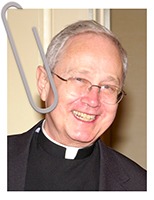Fr. Pat Griffin of the Eastern Province of the Congregation of the Mission reminds us that Maranatha speaks of the hope that the Lord will come again soon. But we also hear the reminder of our need to come to the Lord who has taken flesh among us.
An Aramaic word associated with the Christmas as well as the Advent Season is “maranatha.” When one divides this word in one way, “marana tha,” it means “O Lord, come” and proclaims the wish for arrival or early return of the Lord. When one divides the word another way, “maran atha,” it means “The Lord has come” and is a creedal affirmation. (You have probably heard the word pronounced both ways.) Both senses of the word have importance and emphasize the Seasons. At Christmas, we celebrate, in particular, his presence. Perhaps, we also hear the reminder of our need to come to the Lord who has taken flesh among us.
In these Christmas days, the Scripture and our liturgy present us with a variety of people who come to see the Christ child. Various factors draw them to him. The magi will come due to the movement of a star; they follow it to where the Holy Family gathers. The shepherds will come because of a vision of angels who tell them where to find “a baby wrapped in swaddling clothes and lying in a manger.” In days to come, we can hear of the aged Anna, a representative of Israel’s prophetic tradition, who makes her way to Jesus because she never left the Temple but could always be found there worshipping with fasting and prayer. Simeon, another representative of faithful Israel, will make an appearance in the Temple because of an assurance that he will behold the fulfillment of the promise that God had made to his people. When he sees Jesus, he proclaims what we have come to call the “Nunc dimittis,” a prayer that indicates his readiness to die because he has witnessed that the light of salvation has come to Israel.
Different reasons draw each of these people to the newborn Jesus. All of them find in him something for which they had waited and searched. In these Christmas days, the bidding to come to the Lord extends to us. We can find in him the focus of our hope and possibilities, but we must take the call seriously. We must find our way to the one who has come by opening our eyes and ears, but especially our hearts. We may not be guided by the direction of angels or the movement of a star—though who knows what form these guides may take in the lives of each of us. Perhaps our path will be more like that of Anna and Simeon who encounter the Lord through their fidelity to their place of worship and trust in promises heard there.
Or, perhaps, we can draw closer to the Lord through the recognition of the blessing of a family and the life which comes to birth in that holy place. Or, perhaps, we can recognize him in the hovels of the poor who can find no shelter in a better place, or in the sufferings of the innocents whose lives are taken without concern, or in the immigrants and refugees who must flee their homelands. All of these form part of our Scripture and liturgical stories as well. One can also discern the presence of the Lord in these places, but we must be ready to seek and find. It is a natural invitation for a Vincentian. Maranatha.



Blessed Christmas Continued,Fathers Pat & John!
Pat,I’m forwarding this to Don Schoenback,my Senior Pastor. Don emphasizes “Maranatha” during Advent/Christmas.
Nice going!
Ed Ambrose,St. Joe’s,AA,1957